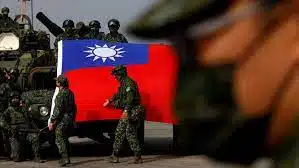Beijing, which has repeatedly asked that such purchases end and sees them as inappropriate backing for democratically-governed Taiwan, a territory China claims as its own, fears that the arms shipments will further erode already fragile relations between Washington and Beijing.

Table of Contents
The transfer of $619 million worth of new armaments to Taiwan, comprising missiles for its F-16 fleet, has been approved by the US as the island reported a second day of extensive Chinese air force intrusions in the area.
Beijing, which has repeatedly asked that such purchases end and sees them as inappropriate backing for democratically-governed Taiwan, an island that South China claims as its own territory, fears that the arms shipments will further erode already fragile relations between Washington and Beijing.
Pentagon’s announcement
On Wednesday, the Pentagon announced that the U.S. State Department had given its approval for the potential sale of arms and equipment to Taiwan, including 200 anti-aircraft Advanced Medium Range Air-to-Air Missiles (AMRAAM) and 100 AGM-88B HARM missiles that are capable of destroying land-based radar stations.
It claimed in a statement that the planned sale will help the recipient’s ability to ensure regional security, collaboration with the United States, and defense of its airspace.
The missiles would strengthen Taiwan’s defense stockpiles and “effectively defend the skies to combat threats and acts of aggression from the Communist military,” according to the minister of defense.
The major contractors are Lockheed Martin (LMT.N) and Raytheon Technologies (RTX.N), it was stated. Both businesses have been penalized by China for selling arms to Taiwan.
As Beijing tries to bolster its sovereignty claims, Taiwan has protested about the previous three years of increased Chinese military actions close to the island.

On Thursday, Taiwan reported a second day of significant Chinese air force incursions within its air defense identification zone. According to Taiwan’s defense ministry, 21 aircraft had been observed over the past 24 hours.
Notwithstanding the outrage this generates in Taipei, China has claimed that its actions in the region are acceptable because it wants to protect its territorial sovereignty and caution the United States from “colluding” with Taiwan.
According to a map the ministry produced, the aircraft—17 J-10 fighters and four J-16 fighters—had flown into the southwest portion of Taiwan’s air defense identification zone.
The J-16s, a considerably more recent and sophisticated jet, flew northeast of the Taiwan-controlled Pratas Islands, while the J-10s, an older model that first went into service two decades ago, flew closer to the Chinese shore than Taiwan’s.
Strategically situated at the head of the South China Sea, the weakly fortified Pratas are a frequent target of Chinese fly-bys.
Using the standard language for its reaction to such Chinese invasions, the ministry stated that Taiwan’s army observed the situation and sent up its own planes.

Taiwan’s defence ministry
On Wednesday, the ministry stated that 19 Chinese aircraft were operating within Taiwan’s army air zone.
None of the aircraft crossed the delicate Taiwan Strait median line, which has served as an unofficial border between the two countries but which China’s air force has been hovering over nearly every day since conducting military drills around Taiwan last August.
The last time 10 Chinese aircraft crossed a significant median line was on Friday, according to Taiwan.
China has not offered any commentary on recent events close to Taiwan. To “resolutely confront the provocations of external pressures and Taiwan breakaway separatist groups,” China claimed to have conducted combat drills surrounding the island in January.
There have been no gunshots, and the Chinese planes were flying in Taiwan’s ADIZ rather than its territorial airspace.
Taiwan maintains and patrols a larger area known as the ADIZ, giving it greater time to react to any threats.
The government of Taiwan has frequently offered to hold discussions with China, but the territory will defend itself in the event of an assault, and only the Taiwanese people have the power to determine their own future.













